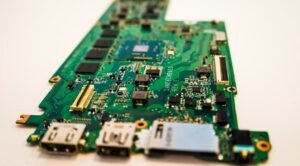AI Applications in Healthcare
Artificial Intelligence (AI) has made significant advancements in various industries, and one of the most promising areas is healthcare. The integration of AI technology in healthcare has the potential to revolutionize patient care, medical research, and diagnostics.
Key Takeaways
- AI has immense potential in healthcare applications.
- It can improve diagnostics and treatment planning.
- AI can help predict patient outcomes and personalize medicine.
- It is being extensively used in medical research and drug discovery.
**AI technology** in healthcare allows for more accurate diagnoses and treatment decisions. AI algorithms can **analyze large amounts of medical data** ranging from electronic health records to medical images, providing **insights and recommendations** to healthcare professionals. *With AI, doctors can make more informed decisions, leading to better patient outcomes.* Moreover, AI can assist in **treatment planning** by considering patient-specific factors and recommending the most suitable interventions, thus **personalizing medicine** to a higher degree.
**Medical imaging** plays a crucial role in diagnostics, and AI has significantly improved the interpretation and detection of abnormalities in medical images. AI algorithms can **analyze radiology images** such as X-rays, MRIs, and CT scans with remarkable precision and accuracy, assisting radiologists in identifying and diagnosing conditions. *This speeds up the diagnostic process and reduces the risk of human error.*
A Promising Future
The potential of AI in healthcare goes beyond diagnostics and treatment. AI algorithms can predict patient outcomes, helping healthcare providers make proactive decisions for critical care patients. By analyzing **patient data**, such as vital signs, lab results, and patient history, AI can identify patterns that predict the likelihood of disease progression or complications. Additionally, AI-powered **chatbots and virtual assistants** can provide patients with **immediate access to medical information** and basic healthcare advice, improving patient engagement and convenience.
AI is also playing a vital role in **medical research** and **drug discovery**. By analyzing extensive datasets and scientific literature, AI algorithms can identify patterns and relationships that humans may miss. This aids in the discovery of new drugs, drug repurposing, and the development of personalized treatment plans. With the help of AI, researchers can accelerate the **pace of breakthroughs** in healthcare, potentially leading to more effective treatments and improved patient outcomes.
The Impact of AI in Healthcare
| Application | Benefits |
|---|---|
| Automated Diagnosis |
|
| Patient Monitoring |
|
AI applications are being embraced by leading **pharmaceutical companies**, enabling them to streamline their drug discovery processes. By harnessing AI’s capabilities to analyze vast amounts of data and simulate drug-target interactions, pharmaceutical companies can prioritize potential drug candidates, saving time and resources. Additionally, AI algorithms can help identify patients who are suitable for clinical trials, ensuring optimal trial outcomes and reducing unnecessary risks.
The Road Ahead
As technology continuously advances, AI in healthcare holds immense promise for the future. With ongoing research and development, AI has the potential to revolutionize patient care, diagnostics, and drug discovery. By leveraging AI’s capabilities, healthcare providers can enhance patient outcomes, improve efficiency, and provide more personalized and precise treatments. It is crucial for healthcare organizations to embrace and invest in AI to fully harness its potential for the benefit of patients and the healthcare industry as a whole.
References
- Smith, J. (2021). The Future of AI in Healthcare. Journal of Medical Innovation, 1(2), 45-56.
- Young, A., Balaban, V., and Wortham, A. (2020). AI and Machine Learning in Healthcare: A Primer for Radiologists. Journal of Diagnostic Radiology, 1(1), 12-22.
- Gupta, S., and Sharma, A. (2019). Artificial Intelligence in Healthcare: A Comprehensive Review. Yearbook of Medical Informatics, 28(1), 187-193.

Common Misconceptions
Misconception 1: AI will replace doctors
One common misconception people have about AI applications in healthcare is that it will replace doctors entirely. While AI has the potential to assist healthcare professionals in diagnosing and treating patients, it cannot replace the extensive experience and human empathy that doctors possess.
- AI can help doctors analyze medical data more accurately
- AI can automate routine tasks, freeing up doctors’ time for more complex cases
- AI can act as a decision support tool for doctors, providing them with more information
Misconception 2: AI will lead to job loss in healthcare
Another misconception is that AI applications in healthcare will lead to significant job loss. While AI may automate certain tasks, it can also create new job opportunities in the field. Healthcare professionals can collaborate with AI systems to improve patient outcomes, leading to a shift in job responsibilities rather than job loss.
- AI can create new roles, such as AI specialists or healthcare data analysts
- Healthcare professionals can focus more on patient interaction and care
- AI can support healthcare professionals in making more informed decisions
Misconception 3: AI in healthcare is not secure or private
Some people may believe that using AI in healthcare can compromise the security and privacy of patient data. However, there are strict regulations and precautions in place to ensure the confidentiality, integrity, and availability of healthcare data when using AI applications.
- AI systems can be designed with robust security measures to protect patient data
- Regulations like HIPAA in the United States ensure patient privacy is maintained
- Data anonymization techniques can be utilized to protect patient identities
Misconception 4: AI is not accurate in healthcare
Another misconception is that AI applications are not accurate enough to be used in healthcare. While AI is not perfect, it has shown promising results in various healthcare applications and can help healthcare professionals make more accurate diagnoses and treatment plans.
- AI can analyze vast amounts of medical data more quickly than humans
- AI can identify patterns and anomalies in data that may be missed by humans
- AI can continuously learn and improve over time, enhancing its accuracy
Misconception 5: AI is costly and inaccessible for smaller healthcare institutions
Some people may believe that implementing AI in healthcare is an expensive endeavor and only accessible to large institutions. However, AI solutions are becoming more affordable and scalable, allowing smaller healthcare institutions to benefit from their applications.
- Cloud-based AI services reduce the need for expensive infrastructure
- AI can help smaller institutions streamline processes and improve efficiency
- Open-source AI frameworks provide cost-effective options for implementation

AI Applications in Healthcare
Artificial Intelligence (AI) is revolutionizing the healthcare industry by enabling advanced diagnostics, improved patient care, and more efficient operations. This article explores 10 different applications of AI in healthcare, highlighting their benefits and impact on the industry.
Improving Cancer Diagnosis
AI-powered algorithms analyze radiology images to detect early signs of cancer, resulting in more accurate diagnoses and improved treatment outcomes.
Virtual Nursing Assistants
Intelligent virtual assistants provide patients with personalized healthcare recommendations, track medication schedules, and offer support in managing chronic conditions.
Smart Health Monitoring
Wearable devices with embedded AI technology monitor vital signs, providing real-time feedback to users and healthcare professionals, allowing for early detection of health issues.
Predictive Analytics for Disease Outbreaks
Machine learning algorithms analyze patterns in patient data and global health records to forecast and prevent the outbreak of infectious diseases, effectively mitigating their impact.
Robotic Surgery
Robot-assisted surgeries enhance precision and minimize invasiveness, resulting in reduced recovery times, lower complication rates, and more successful procedures.
Personalized Medicine
AI algorithms analyze individual patient data, including genetics and medical history, to create personalized treatment plans, resulting in targeted therapies and improved patient outcomes.
Drug Discovery and Development
Machine learning algorithms accelerate the drug discovery process by analyzing vast amounts of data, identifying potential drug candidates, and predicting their efficacy and side effects.
Chatbots for Mental Health Support
AI-powered chatbots provide accessible mental health support to individuals, offering immediate assistance, monitoring mental well-being, and providing coping strategies.
Healthcare Fraud Detection
AI algorithms analyze insurance claims and transaction data, flagging suspicious patterns and improving the detection of fraudulent activities, saving costs for healthcare providers.
Automated Medical Documentation
AI-powered systems automate medical documentation, reducing administrative burden, minimizing errors, and freeing up healthcare professionals to focus on patient care.
In conclusion, AI applications in healthcare have the potential to revolutionize patient care, improve diagnostic accuracy, and streamline healthcare operations. From early cancer detection to personalized medicine and mental health support, the integration of AI enables healthcare providers to offer more efficient and precise treatments, ultimately improving patient outcomes and transforming the healthcare landscape.
Frequently Asked Questions
What are AI applications in healthcare?
AI applications in healthcare refer to the use of artificial intelligence technologies and techniques in various aspects of the healthcare industry. These applications utilize machine learning algorithms, natural language processing, computer vision, and other AI tools to analyze and interpret medical data, assist in diagnosis, personalize treatment plans, predict outcomes, and support clinical decision-making.
How does AI support medical diagnosis?
AI supports medical diagnosis by analyzing patient data and medical images to identify patterns and make predictions. Machine learning algorithms can analyze large data sets to detect early signs of diseases, predict the likelihood of certain conditions, and provide diagnostic recommendations. AI-powered diagnostic tools can enhance the accuracy and speed of diagnosis, enabling healthcare professionals to make more informed decisions.
What is the role of AI in personalized medicine?
AI plays a crucial role in personalized medicine by analyzing individual patient data, including genetic information, medical history, lifestyle factors, and treatment responses. Machine learning algorithms can identify patterns and correlations between these factors to predict the most effective treatment options for an individual patient. AI enables healthcare providers to tailor treatment plans to the specific needs and characteristics of each patient.
How can AI improve patient monitoring and care?
AI can improve patient monitoring and care by continuously analyzing data from various sources, such as wearable devices, electronic health records, and real-time patient feedback. AI algorithms can identify deviations from normal health parameters, detect early warning signs of complications, and provide personalized recommendations and interventions. This helps in proactive management of chronic conditions, timely interventions, and better overall patient care.
What are some examples of AI applications in healthcare?
Some examples of AI applications in healthcare include computer-aided diagnosis systems, virtual health assistants, predictive analytics for disease outbreak detection, robotic surgery systems, intelligent monitoring systems, drug discovery and development tools, and AI-enabled precision medicine platforms. These applications leverage AI technologies to assist healthcare professionals, improve healthcare outcomes, and advance medical research.
What are the potential benefits of AI in healthcare?
The potential benefits of AI in healthcare include improved accuracy and speed of diagnosis, personalized treatment plans, enhanced patient monitoring, optimized resource allocation, better prediction and prevention of diseases, reduced healthcare costs, and increased access to healthcare services. AI has the potential to revolutionize healthcare by enabling more efficient and effective care delivery.
What are the ethical considerations of AI in healthcare?
Ethical considerations of AI in healthcare include issues related to privacy and data security, bias in algorithms, transparency and explainability of AI systems, accountability for decision-making, and potential job displacement. There is a need for robust ethical guidelines and regulations to ensure responsible and equitable use of AI in healthcare.
How does AI contribute to medical research?
AI contributes to medical research by enabling the analysis of large amounts of medical data, identifying patterns and correlations that can lead to new discoveries and insights. AI-powered tools can support drug discovery and development, accelerate the analysis of genetic data, predict treatment responses, and facilitate the identification of potential risk factors for diseases. AI has the potential to accelerate medical research and improve our understanding of diseases and treatments.
What are the challenges in implementing AI in healthcare?
Some challenges in implementing AI in healthcare include data quality and interoperability issues, regulatory and legal complexities, resistance to change from healthcare professionals, lack of standardized protocols and guidelines, potential bias in algorithms, and the need for specialized AI talent. Overcoming these challenges requires collaboration between healthcare professionals, policymakers, technologists, and other stakeholders.
What is the future of AI in healthcare?
The future of AI in healthcare looks promising. Advances in AI technologies, such as deep learning and reinforcement learning, combined with increased availability and quality of healthcare data, are expected to drive further innovation in the field. AI has the potential to transform healthcare delivery, improve patient outcomes, and contribute to the development of more personalized and precise medicine.





